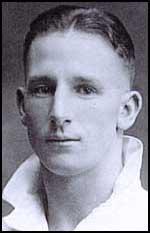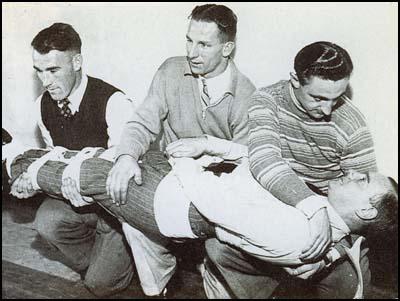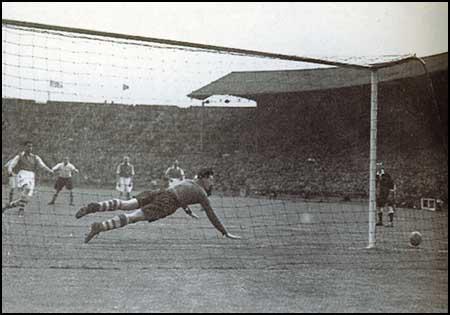Andrew Beattie

Andrew Beattie was born in Aberdeen on 11th August 1913. He played full-back for local side, Inverurie Loco, before joining Preston North End for a fee of £150 in 1935.
Beattie did not gain a regular place in Preston's first-team until the 1936-37 season. The following season Preston purchased the high scoring George Mutch, from Manchester United for £5,000. The following month, Robert Beattie a skillful inside forward, arrived from Kilmarnock for a fee of £2,500. They joined fellow Scotsmen, Beattie, Jimmy Dougal, Jimmy Maxwell, Tom Smith, Hugh O'Donnell, Francis O'Donnell, and Bill Shankly in the side.
Beattie had a good season and on 17th April, 1937 he won his first international cap when he played for Scotland against England at Hampden Park. Scotland won 3-1 and he regained his place against Austria on 9th May 1937.
Preston had a successful run in the 1937-38 FA Cup. Preston beat West Ham United in the 3rd round with George Mutch scored a hat trick. Mutch also scored goals in the 4th round against Leicester City and in the semi-final when Preston beat Aston Villa 2-1.
In the FA Cup Final Preston played Huddersfield Town. This was the first time that a whole match was shown live on television. Even so, far more people watched the game in the stadium as only around 10,000 people at the time owned television sets. No goals were scored during the first 90 minutes and so extra-time was played. In the last minute of extra-time, Bill Shankly put George Mutch through on goal. Alf Young, Huddersfield's centre-half, brought him down from behind and the referee had no hesitation in pointing to the penalty spot. Mutch was injured in the tackle but after receiving treatment he got up and scored via the crossbar. It was the only goal in the game and Beattie won a cup winners' medal.
On 9th April, 1938 Beattie played for Scotland against England at Wembley. Also in the Scottish team were Preston colleagues, Bill Shankly, George Mutch, Tom Smith and Francis O'Donnell. Scotland won 1-0 with Mutch scoring the only goal of the game. He also won international caps against Czechoslovakia (May, 1937), Wales (November, 1938) and Hungary (December, 1938). The outbreak of the Second World War brought an end to his international career. However, he did play in five unofficial internationals during the war.

aid at the local Air Raid Precautions centre in November, 1939.
Beattie was a member of the Preston North End team that won the North Regional League title in 1941. It has been argued by Jack Rollin (Soccer at War: 1939-45) that: "The first club to benefit from a youth policy to any marked degree was Preston North End, who owed success in 1940-41 to their exceptional pre-war structure. By 1938 the club was already running two teams in local junior circles when the chairman James Taylor decided upon a scheme to fill the gap between school leavers and junior clubs by forming a Juvenile Division of the Preston and District League open to 14-16-year-olds."
Rollin points out that by 1940 over 100 youngsters were being trained in groups of eight of the club's senior players voluntarily assisting in evening coaching. One of the first youngsters to emerge from this coaching system was the great Tom Finney. Others youngsters to emerge during this period included Andrew McLaren and William Scott.
The Blitz was still taking place when the 1941 Football League Cup competition took place. Preston North End beat Bury, Bolton, Tranmere, Manchester City and Newcastle to reach the final. The Preston team that faced Arsenal at Wembley on 31st May was: Jack Fairbrother, Frank Gallimore, William Scott, Bill Shankly, Tom Smith, Andrew Beattie, Tom Finney, Andrew McLaren, Jimmy Dougal, Robert Beattie and Hugh O'Donnell.
Preston played Arsenal in front of a 60,000 crowd. Arsenal was awarded a penalty after only three minutes but Leslie Compton hit the foot of the post with the spot kick. Soon afterwards Andrew McLaren scored from a pass from Tom Finney. Preston dominated the rest of the match but Dennis Compton managed to get the equaliser just before the end of full-time.

Leslie Compton (Arsenal) during the 1941 Football League Cup Final. The ball
hit the post and bounced back into play.
The replay took place at Ewood Park, the ground of Blackburn Rovers. The first goal was as a result of a move that included Tom Finney and Jimmy Dougal before Robert Beattie put the ball in the net. Frank Gallimore put through his own goal but from the next attack, Beattie scored again. It was the final goal of the game and Preston ended up the winners of the cup.
Beattie regained his place in the Preston North End after the war. However, after a few games of the new season he left the club to become manager of Barrow. This was followed by jobs with Stockport County and Huddersfield Town, where Andrew Beattie was his assistant manager. He had limited success and for a while he was a sub-postmaster in Penwortham.
He was persuaded to leave this secure job to manage Carlisle United. This was followed by managerial jobs at Nottingham Forest, Plymouth Argyle and Wolverhampton Wanderers.
In February, 1954, Beattie was appointed manager of Scotland. However, he resigned after six matches because of a series of bad results in the World Cup. He also held the job from March 1959 to October 1960. Once again he resigned after his failure to achieve success.
Andrew Beattie died on 20 September 1983.
